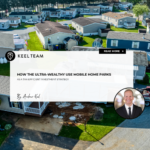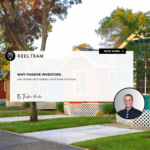Mobile Home Park Purchase Blueprint: Typical Best Practices
-
 Tristan Hunter - Investor Relations
Tristan Hunter - Investor Relations
Introduction to Unveiling Mobile Home Park Blue Print Best Practices :
Investing in a mobile home park requires a strategic approach and thorough evaluation to lay a foundation for a potentially successful venture. A Mobile Home Park purchase decision is multifaceted, involving considerations ranging from financial viability to community dynamics. In this article, discover the essential strategies for a potentially successful mobile home park purchase with our Blueprint Best Practices and unlock insights to possibly make informed decisions.

Understanding the Mobile Home Park Landscape:
Before diving into the evaluation process, it’s essential to understand the unique landscape of mobile home park investments. Mobile home parks operate on a distinct model where residents typically own their homes but lease the land. This distinctive setup requires a nuanced evaluation approach that considers both the physical and social aspects of the property.
A Few Best Practices for Evaluating a Potential Mobile Home Park Purchase:
Thorough Due Diligence:
One of the cornerstones of evaluating any potential mobile home park is conducting thorough due diligence. This involves a meticulous examination of various factors, including the mobile home park’s financial performance, infrastructure, tenant dynamics, and the local real estate market. Investing time and resources in comprehensive due diligence is usually crucial for identifying potential risks and opportunities.
Financial Analysis:
A robust financial analysis is often imperative when evaluating a mobile home park for purchase. Scrutinize the historical financial records, including income statements, expense reports, and tax returns. Assess the mobile home park’s revenue sources, operating expenses, and potential for income growth. A clear understanding of the financial landscape is generally essential for projecting possible future returns and helps aim to ensure the investment aligns with your financial goals.
Tenant Stability and Turnover Rates:
Stability within the tenant community is typically a key indicator of a well-functioning mobile home park. Evaluate tenant turnover rates and assess the reasons behind any turnover. A mobile home park with a stable tenant base is likely to have higher occupancy rates, reduced vacancy periods, and lower turnover costs, contributing to the overall potential profitability of the investment.
Infrastructure and Property Condition:
Thoroughly assess the condition of the mobile home park’s infrastructure and property. This includes roads, utility systems, common areas, and individual mobile homes. Identifying any deferred maintenance or potential capital expenditures is crucial for estimating future costs and aids in ensuring the property is well-maintained.
Market Demand and Location:
Evaluate the market demand for mobile homes in the specific location of the park. Consider demographic trends, economic conditions, and the overall demand for affordable housing. A mobile home park situated in an area with high demand for affordable housing is likely to be a more lucrative investment. Consider putting out a test ad to gauge what level of market people in the area are looking for.
At Keel Team, we typically buy mobile home parks in markets with a median income of $40,000 or higher and a median home price above $100,000, something that we strongly consider in order to make or break a deal. We also look for markets with diverse employment, rather than a one horse town.
Download our free eBook on the “Top 20 Things Learned from Mobile Home Park Investing “
By Andrew Keel

Legal and Regulatory Compliance:
Ensure the mobile home park is in compliance with all local and federal regulations. This includes zoning laws, health and safety codes, and tenant rights. Legal compliance is usually crucial for avoiding legal complications and supporting a potentially smooth and secure investment.
Community Atmosphere and Management Practices:
Assess the community atmosphere within the mobile home park. A positive and well-managed community is more likely to attract and retain quality tenants. Understand the mobile home park’s management practices, including how they handle tenant relations, property maintenance, and dispute resolution.
Future Growth Potential:
Evaluate the potential for future growth in the mobile home park and the surrounding area. Consider factors such as population growth, economic development, and any upcoming infrastructure projects that could positively or negatively impact the property’s value. Investing in a mobile home park with growth potential is often a great strategic step toward the potential, long-term viability of the investment.
Operational Efficiency:
Analyze the operational efficiency of the mobile home park. Consider the mobile home park’s management processes, technology integration, and overall efficiency in handling day-to-day operations. Streamlined and efficient operations can likely contribute to a more successful and profitable investment.
Environmental and Regulatory Risks:
Identify any environmental risks associated with the mobile home park, such as potential contamination or hazardous materials. Additionally, assess the park’s susceptibility to regulatory changes that could impact its operations. Understanding and mitigating these risks are essential for the potential long-term success of the investment.

Concluding Thoughts on the Best Practices for Potential Success:
Evaluating a potential mobile home park for purchase is a comprehensive process that usually requires a keen eye for detail and a thorough understanding of the unique dynamics of this investment type. By adhering to best practices such as conducting thorough due diligence, analyzing financial performance, assessing tenant stability, and considering future growth potential, investors can possibly make informed decisions that align with their investment goals.
The success of a mobile home park investment is often intricately tied to the careful evaluation of both tangible and intangible aspects. As the demand for affordable housing continues to rise, mobile home parks present a potentially dynamic investment opportunity. Armed with a strategic evaluation approach, investors can likely navigate the complexities of this market, identify promising opportunities, and set the stage for a potentially successful and rewarding investment journey.
At Keel Team Mobile Home Park Investments, our focus is on elevating our communities and maximizing our investor returns. We are dedicated to enhancing the quality of resident life while we aim to ensure strong returns for our limited partner investors. Contact us using the information below for more insights into our investment strategy
Learn more about mobile home park investing.
Interested in learning more about mobile home park investing? Get in touch with us today to find out more.
Disclaimer:
The information provided is for informational purposes only and should not be considered investment advice, nor a guarantee of any kind. There are no guarantees of profitability, and all investment decisions should be made based on individual research and consultation with registered financial and legal professionals. We are not registered financial or legal professionals and do not provide personalized investment recommendations.

Tristan Hunter - Investor Relations
View The Previous or Next Post
Subscribe Below 👇




